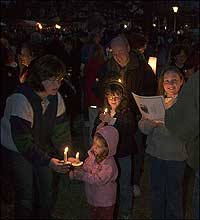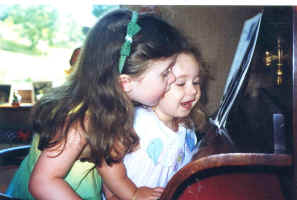Sunday, July 16, 2006
Music With Your Children
 While combing through the Zenit archives, I ran across this piece from the World Meeting of Families held in World Meeting of Families held recently in Valencia, Spain. (Where Pope Benedict traveled to preside at the conference's closing liturgy.)
While combing through the Zenit archives, I ran across this piece from the World Meeting of Families held in World Meeting of Families held recently in Valencia, Spain. (Where Pope Benedict traveled to preside at the conference's closing liturgy.)
Parents should help educate their children by reading aloud and listening to music with them, says a marriage and family expert. Michael Waldstein, president of the International Theological Institute for Studies on Marriage and the Family in Gaming, Austria, made this suggestion Wednesday, saying that the "entertainment industry" "attacks the most immature passions " of minors, "especially eroticism and anger." Waldstein, who addressed the Theological-Pastoral Congress being held in Valencia within the framework of the 5th World Meeting of Families, urged that "children's education not be abandoned to television, radio or music," as they can harm minors because of the counter values they present.Quite true. It also got me thinking. Here are a few practical suggestions for you, but I leave readers to determine the specifics they might use with their own children depending on parental ability and the child's maturity. I think the best musical exposure one can provide is to sing for and with your children. Lots of people sing to their babies and toddlers, and this is an excellent introduction to music for a child. Even though they're not sung as much these days, traditional songs such as "Old MacDonald" or "Row, Row, Row Your Boat" give a child an easy way to join an adult in singing. I used to make up new verses for the farm song when we sang it: eagles, bunnies, tractors, helicopters, etc..
 It's important for children to sing with you rather than with a recording. There are subtleties in live music that require skills in listening and focusing attention. Singing to a tape can hamper later musical development. This is because a musical learner has not been exposed to the need for teamwork in music: matching pace, pitch, breathing, and so on. I've seen kids who memorized their taped accompaniment and sang great in practice. Then they were lost when they needed to sing or play with a live musician.
Waldstein is right about listening to music with your child. If you know a lot about music, it will be easy to listen to and discuss music with your child. If you know very little, here are some hints:
1. Read liner notes for recordings. Educate yourself about the circumstances of the writing and performance of the music you share with your child.
2. Let your children see you listen to music. Play recordings instead of tv or videos. Listen to music while cooking, cleaning, or doing other tasks. Listen to music and just listen sometimes.
3. Attend school concerts whether your child has a part or not. It's actually good to attend musical performances at other schools. On occasion, my wife and I take Brittany to high school or college concerts. She gets to see older kids and young adults perform in a "professional" way. The quality is not nearly what you get from the symphony, but the audience is always enthusiastic and you help support the arts in your area schools.
4. Many colleges and churches have free concerts: organ recitals, faculty or student programs, and the like. Take advantage of these concerts which are free or have low ticket prices.
5. At least once a year, it's a good idea to take the whole family to the symphony or the ballet or the opera. I'd consider this an essential for a child of ten or older. While there won't likely be tailgating as at the stadium, you might not mind gong upscale with champagne and chocolate goodies in the concert hall vestibule. If the symphony offers a pre-concert lecture, take advantage of that.
6. Lots of colleges and symphonies have special events. Here in KC, both the city's university and the symphony have instrument "petting zoos," in which your child can get up close to the various instruments of the orchestra.
Maybe other folks have additional ideas on this front. Feel free to share.
It's important for children to sing with you rather than with a recording. There are subtleties in live music that require skills in listening and focusing attention. Singing to a tape can hamper later musical development. This is because a musical learner has not been exposed to the need for teamwork in music: matching pace, pitch, breathing, and so on. I've seen kids who memorized their taped accompaniment and sang great in practice. Then they were lost when they needed to sing or play with a live musician.
Waldstein is right about listening to music with your child. If you know a lot about music, it will be easy to listen to and discuss music with your child. If you know very little, here are some hints:
1. Read liner notes for recordings. Educate yourself about the circumstances of the writing and performance of the music you share with your child.
2. Let your children see you listen to music. Play recordings instead of tv or videos. Listen to music while cooking, cleaning, or doing other tasks. Listen to music and just listen sometimes.
3. Attend school concerts whether your child has a part or not. It's actually good to attend musical performances at other schools. On occasion, my wife and I take Brittany to high school or college concerts. She gets to see older kids and young adults perform in a "professional" way. The quality is not nearly what you get from the symphony, but the audience is always enthusiastic and you help support the arts in your area schools.
4. Many colleges and churches have free concerts: organ recitals, faculty or student programs, and the like. Take advantage of these concerts which are free or have low ticket prices.
5. At least once a year, it's a good idea to take the whole family to the symphony or the ballet or the opera. I'd consider this an essential for a child of ten or older. While there won't likely be tailgating as at the stadium, you might not mind gong upscale with champagne and chocolate goodies in the concert hall vestibule. If the symphony offers a pre-concert lecture, take advantage of that.
6. Lots of colleges and symphonies have special events. Here in KC, both the city's university and the symphony have instrument "petting zoos," in which your child can get up close to the various instruments of the orchestra.
Maybe other folks have additional ideas on this front. Feel free to share.